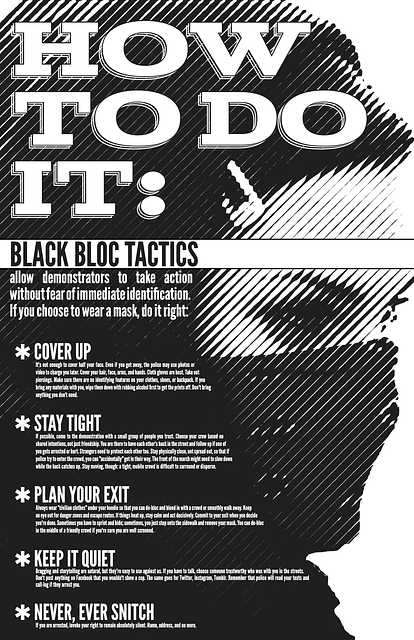If you are participating in dangerous protests, especially if you are part of a group targeted by police violence, please take steps to minimize the likelihood that police and other repressive entities will be able to capture or identify you. You deserve to be safe and free!
Here is a handout that was circulated during the protests in Durham, North Carolina against the killing of Jesus “Chuy” Huerta in November 2013. You can read a collection of texts about those protests here.
In addition, here is a short guide to being prepared for public order situations. Thank you for your courage, and good luck.
Mask Up
How & why to protect yourself at demonstrations
People conceal their identities from police and media during demonstrations for many different reasons: school, employment, immigration status, Child Protective Services, right-wing vigilantes. This is important regardless of whether you intend to break the law. The more common we make this practice, the safer everyone can be. Together, we have tremendous power.
Dress Appropriately

Bring multiple layers: one outfit to get into the area, another for the action, and something that will help you blend in when it’s time to make your exit. Take out piercings; conceal tattoos. Some protesters wear identical clothing—black hooded sweatshirts, pants, and masks—in order to be indistinguishable. If you do this, make sure your clothes have no identifying features. Your shoes or backpack could also identify you.
If you wear a mask, put it on out of view of cameras or police and keep it on the whole time you’re in action. Cover your hair completely. To a mask out of a T-shirt, stretch the neck hole across your eyes and tie the sleeves tight behind your head, with the rest of the shirt covering your head and shoulders. Police may target isolated masked individuals, so stay together until you reach a safe place to change clothes and disperse.
Goggles can protect your eyes from chemical weapons; sunglasses can make you less recognizable. Both are available in prescription form; beware contact lenses trapping chemical weapons against your eyes. A bandana soaked in apple cider vinegar may help you breathe if you are tear-gassed or pepper-sprayed. Wear cloth gloves; fingerprints stick to latex, and leather gloves leave their own fingerprint.
Come Prepared
You could bring water, first-aid supplies, banners, flags, drums, whistles, a megaphone, a sound system, a sign that doubles as a shield, stickers, spray paint, flares, torches, Christmas tree ornaments filled with paint, firecrackers, a hammer, or a police scanner. Wipe down anything you might lose in the streets with alcohol ahead of time to get the prints off. Consider using a temporary phone instead of your usual one. Remember that your call history and text messages can be traced to you on any phone connected to your name; the police will certainly check these if they capture you. Make sure you know a phone number to call if you are arrested or get separated from your friends and need help.
Stick with friends you trust using the buddy system. Talk ahead of time about what you want to do and how you will communicate. Case the area in advance for targets, materials, danger zones, and escape routes. Plan in advance how and where you can disperse.

In the Streets
Stick together. Don’t let the crowd get stretched out too far; carry messages between the front and back. Friends on bicycles can keep you updated on what’s happening nearby.
Make it clear to the police as soon as they show up that they’re not in charge. Your assertiveness and willingness to protect each other are your permit. Like other bullies, the slightest compromise will embolden them, but if they see that there is no way for them to take control, they may back off. Police will bluff and lie, but you may be able to predict their behavior by what they appear materially prepared to do.
Don’t let officers enter the crowd. Hold banners up along the sides; link arms if you have to. If the police want to grab someone, get in the way. Keep moving so they don’t get a chance to pen you in. If you see them blocking off a street ahead, move fast before they can surround and trap you. Keep them guessing. Quit while you’re ahead.

Behind Enemy Lines
If the police address you, ignore them unless they specify that you are being detained or arrested. If they seize you, don’t resist unless you’re sure you can escape; resisting can get you higher charges. If you are arrested, invoke your right to remain silent. Answer no questions beyond your name and address, no matter what they say. Never tell the police anything about other people, even if it seems insignificant.
Don’t post anything on Facebook, Twitter, or any other site that you wouldn’t show directly to the police. Don’t brag about anything potentially incriminating, or describe others’ actions. Only talk about what happened in a secure environment with people you trust.
The corporate media will repeat the lies of the police. Politicians will try to discredit you or get you to waste time in endless petitioning. Don’t let them intimidate you or stunt your imagination; don’t get sucked into a private grudge match with the authorities. Our power comes from our courage, our dreams, and the connections we build with other people.
